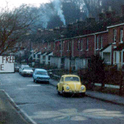Entering the meeting room of Prospect’s Westminster office, John Myers points out the window to the adjoining street, lined with five-storey Georgian and Queen Anne-style townhouses. “This is the kind of gentle density we’d like to see a lot more of.”
Myers is the director of the UK’s national Yimby Alliance and co-founder of London Yimby. The Yimby Alliance’s head of housing research, Kane Emerson, joins us soon after, once he has found a suitable parking spot for his Lime bike.
For the uninitiated: yimby stands for “yes in my backyard”, a global movement which sprung up in opposition to the traditional predominance of “not in my backyard” (nimby) sentiment in city planning and local governance. Many Brits lobby their local councils to block housing and infrastructure projects in their neighbourhoods for fear of aesthetic degradation, crowding or—more perniciously—depreciation of their property values.
The result? According to the Centre for Cities, “compared to the average European country, Britain today has a backlog of 4.3m homes that are missing from the national housing market as they were never built”. Fewer builds make existing homes more expensive, while new homes are pushed further away from established workplaces and amenities.
Both Myers and Emerson exemplify the core demographic of the global yimby movement–young urban professionals, often renters, frustrated at their inability to secure decent and affordable housing in the same way their parents did.
Myers was originally a lawyer, then worked in finance. “I suppose I decided to do something a bit more useful with my life,” he says. “Housing just seemed absolutely the most broken thing I could find.”
He observed the beginnings of a worldwide yimby movement in the mid-2010s, especially in California, where young tech workers priced out of Silicon Valley began organising online. “We saw they had a lot of success, and we thought it’d be good to try to replicate some of that here in the UK.” In 2016 he began organising. What began as a Twitter page and a few volunteers is now an influential activist group.
Emerson’s inspiration for joining was his experience growing up in an overcrowded council home in Northern Ireland. “I had four brothers, and we lived in a three-bed house. That was bad, but nothing compared to what people who live in council housing in London and the southeast have to go through.”
Emerson is a member of the Labour party, and previously worked for the MP Emily Thornberry. “I’ve been out door-knocking nearly every weekend, and you see the most horrific conditions in London,” he says. “You see families where there’s three kids, and they live in one room with the parents.”
In October last year, Keir Starmer declared himself a yimby and pledged to build 1.5m new homes. How has their movement been so successful at convincing those in power?
Myers emphasises the group’s emphasis on the contribution of homebuilding to economic growth, which has neatly aligned with the Labour leadership’s priorities. He notes approvingly a recent Starmer speech claiming every 100,000 homes built adds approximately 1 per cent to GDP.
Critics often caricature the yimby vision as one of soulless concrete blocks obliterating pretty heritage homes–a utilitarian thrust for function over form. But Myers and Emerson’s favourite examples of higher-density neighbourhoods draw on older British architectural traditions.
Myers exalts the medium-height streets of Maida Vale in northwest London. “It is, I think, basically the highest-density area of London and full of gorgeous leafy tree-lined streets with Edwardian mansion blocks. Nobody ever complains to me about the crushing density of Maida Vale.” Emerson, conversely, loves 1930s London County Council estate buildings.
The day after we spoke in July, housing secretary Angela Rayner announced her much-anticipated package of planning reforms, which includes increasing housing targets for most councils, making them mandatory and imposing government intervention on laggard councils.
Whether Labour has the gumption to push past the inevitable resistance from affected homeowners, however, remains to be seen. Rayner may find that, ultimately, some MPs’ yimby conversion isn’t yet impermeable.
But for now, the yimbys are upbeat. The mood in government, says Emerson, is against over-emphasis on process and consultation and in favour of results. “If you’re a low-income family, you don’t need more time for thinking,” he says. “You need a home.”












